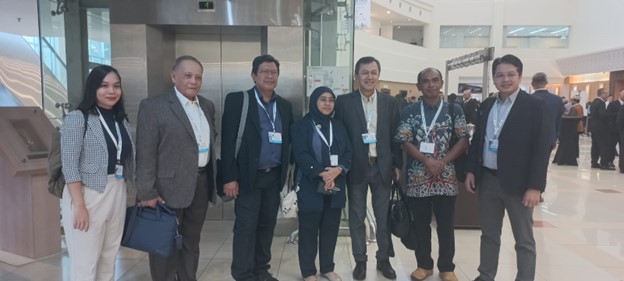The GCF Task Force’s team in APCW, with Dr. Wahyu Marjaka (Director for Sectoral and Regional’s Mobilization and Resources, MoEF Indonesia).
The Asia-Pacific Climate Week (APCW) 2023, held in Johor Bahru and hosted by the Government of Malaysia from November 13 to 17, has emerged as a crucial platform for climate discussions, setting the tone for the upcoming UN Climate Change Conference COP 28 in Dubai. With over 3,000 participants from more than 100 countries in the Asia-Pacific region, this four-day event played a pivotal role in shaping the dialogue on pressing climate issues.
During the event, the Governor’s Climate and Forest Task Force and delegations from North Kalimantan, East Kalimantan, and Papua actively participated, gaining insights into global and regional climate change and forestry policies. Their engagement signaled a commitment to collaborative efforts to address climate challenges and sustainably manage and preserve forests. The APCW 2023 featured four thematic tracks, each addressing crucial aspects of climate action:
- Energy Systems and Industry: Discussions in Track One emphasized the urgent need to enhance ambition and accelerate action toward achieving net-zero pathways. Key sectors, including energy supply, renewable energy potential, and low emission technologies, were prioritized. Follow-up actions include setting ambitious emission reduction targets, promoting renewable energy investments, and fostering collaboration between governments, the private sector, and local communities.
- Cities, Urban, and Rural Development: Track Two underscored the significance of local and subnational engagement in achieving national and global climate targets. Green funding, sustainable urban transport, and public-private collaboration took center stage. Proposed actions involve implementing sustainable transport policies, investing in green infrastructure projects, and integrating climate considerations into urban planning.
- Land, Ocean, Food, and Water: Track Three highlighted the importance of nature-based solutions, youth engagement, and fair involvement of all stakeholders. Discussions aimed at scaling up nature-based initiatives, supporting community-led efforts, and promoting regional cooperation for ocean-based climate action.
- Health, Community-Based Actions, and Climate-Related Displacement: Track Four explored the intersection of climate change with health, livelihoods, and economies. The discussions called for a systems-oriented approach, community-based climate actions, and the recognition of human rights in the face of climate-related displacement.
Delegates gave particular attention to events related to mangrove and peatland management organized by CIFOR and their partners, discussing cases in Bali, updates in the measurement of emissions flux, and financing restoration. They also attended discussions on climate financing, such as a side event on Need-based Finance from the UNFCCC and a carbon market presentation.
In conclusion, APCW 2023 served as a critical juncture emphasizing the imperative of collective action in the lead-up to COP28. As preparations intensify for Dubai and COP28, three key priorities have emerged: establishing regional opinions that matter, ensuring the effectiveness of the global stock take, and achieving the critical goal of limiting global warming to below 1.5 degrees through the global stock take. In essence, APCW 2023 not only demonstrated global cooperation but also symbolized the unwavering determination to confront climate challenges in the Asia-Pacific regions.

